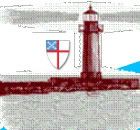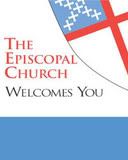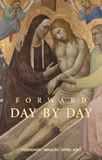St. James' Episcopal Church
Goshen, Indiana
Our 164th Year
Thursday, June 19, 2008
Sermon for June 22nd, 2008
Sermon for June 22, 2008
Proper 7 A
St. James’ Goshen IN
Arthur Hadley
In the portion of the Epistle from the Roman’s read moments ago, Paul is making the case that from the Fall of Adam all humanity lives in sin and death, but with the death, and resurrection of Jesus, the Son of God, all humanity lives in forgiveness and salvation. This is the beginning of the great theological shift from sinful humanity and a judgmental God dishing out damnation, to sinful humanity forgiven by a gracious loving God. Through out the Gospels we see Old Testament stories re-lived with a reversal. Two Sundays ago, we had the Gospel story of Jesus going to the dead daughter of the important man, a leader of the synagogue to raise her from the dead. In the Old Testament the story is Elijah going to the home of a widow to raise her only child, a son, from the dead. A reversal of gender, of importance. David and his band of rebellious soldiers ate holy bread from the altar when they were hungry and had no food. Jesus fed the thousands with five barley loaves and two small fish brought by a poor generous boy. Holy bread of offering reversed to humble bread of generosity.
Paul takes the reversal theology and applies it to Creation with Adam and Eve being tempted by Satan in the form of a snake to eat of the forbidden fruit of the tree of knowledge between good and evil, hence beginning the human trait of sinfulness. All people are descended from Adam and Eve and are guilty of the sin of knowledge between good and evil. We know what is right and wrong and choose to do Wrong. Through out the Old Testament we learn of more and more things that we should not or should do. The Ten Commandment was just a little start of all of the dos and don’ts, but we can not or do not keep the Ten commandments -- Keep holy the Sabbath day; God created all in six days and on the seventh day, the Sabbath, God rested and you shall keep the Sabbath day holy. Well, what did you do? Went shopping, Watched games on TV. That is not keeping the Sabbath holy. We come to Church on the first day of the week, a little Easter, the First day of a new Creation. The reversal of the old creation of sin, and damnation, is the new creation of forgiveness and salvation.
Through out the Gospel we are told to Fear not, do not be afraid, be not anxious. What makes you anxious, fearful? The growing costs of energy, $4.15 for a gallon of gas; I pay $4.85 for a gallon of diesel. It cost how much to heat you home last winter? Wait till this winter. Do you fear Medical bills going up 10% per year? Or is it the rise in food prices that get you going? National security, or lack of it, or the economy in general, or what is it that really worries you?
Jesus said, Fear not. God knows your needs, God knows the number of hairs on you head. God knows and cares for you; fear not.
God sent his only begotten son to be a sacrifice for the sins of the whole world. Sin has been over come. We have been given life ever lasting with the grace, the gift from God of Salvation. All humanity was guilty with the sin of Adam, and all of humanity is made righteous in the sight of God by the life, death and resurrection of Jesus Christ our Lord and Savior.
Thanks be to God
Thursday, June 12, 2008
Sermon for June 15th, 2008
Sermon for Sunday
June 15, 2008
Proper 6 A
(Father’s Day)
St. James’ Goshen IN
Arthur Hadley
Well, Happy Father’s Day. Have you noticed that Father’s Day is seemingly less celebrated than Mother’s Day. I think our attorney Senor Warden should file an anti discrimination class action suit for Dads to get equal attention This is obviously sexual discrimination. Chuck, just think what this would do to give you name recognition in the courts of the land, and in the election process May be not.
Well it is Father’s day and in the Gospel we have Jesus calling forth the earliest Church Fathers, the twelve Disciples: first Simon, who was called Peter, and Andrew his brother; James the son of Zebedee, and John his brother; Philip and Bartholomew; Thomas and Mathew the tax collector; James the son of Alphaeus, and Thaddaeus; Simon the Cananaean, and Judas Iscariot, who betrayed him.
Jesus had been going through all the cities and villages:
Teaching in the synagogues,
Preaching the good news, the Gospel, that the kingdom of God is now and healing every disease and infirmity.
The ministry of Jesus was and continues to be: Teaching, preaching and healing.
But Jesus realized that alone he was not able to do all the teaching, preaching and healing; so he commissioned the twelve disciples to go out and carry on the ministry of teaching, preaching and healing. At first they were to only go to the lost sheep of Israel; later they were told to go out into all the world, every land, every tongue, every tribe, every person.
And the disciples realized they could not do it all either; so they started calling others to help with that ministry. Barnabus was called by the Apostles in Jerusalem, with the charge to go help the new Christians in Antioch. And Barnabas went to Antioch and saw the great working of the Holy Spirit and was glad of the ministries of Paul. Barnabas and Paul worked together for over a year in Antioch. The minstries of Barnabas and Paul prospered and grew. And at that time a great famine occurred in Judah, and the church at Antioch sent Paul and Barnabas to Jerusalem to provide famine relief.
Ministry of the Church is always Teaching, Preaching the nearness of the Kingdom of God, and healing all kinds of infirmities.
Calling new people to carry on the ministries of the Jesus, the ministries of the Body of Christ, the Church, continues. Forty five years ago, on St. Barnabas Day, I was ordained a deacon, a servant, like Barnabas, to teach, preach the nearness of the Kingdom of God, and to heal infirmities. What I teach is what I know from scripture, tradition and reason, the famous three legged stool of Anglican authority: the scriptures were selected by the church using tradition and reason; Tradition is shaped by Scripture and reason. And reason moderated with Scripture and tradition The use of scripture, tradition and reason must always be balanced together in order to be authority. I must preach that the Kingdom of God is near, it is now We must do our part to make the Kingdom of God Now, not something that is far off and always delayed. I am charged with the task of healing: not just a mother’s kiss that makes all things well, nor an occasional band-aid covering up a wound. Real healing is knowing that harm was done, but new growth can overcome the harm.
Those thing are the ministries of the Church, the Body of Christ. Jesus knew he could not do it all, the Apostles knew they could not do it all and every ordained person knows they can not do it all. The whole church, each one of us is called to do the Ministry of Jesus to Teach, Preach and Heal. Go and do the work of the Kingdom of God -- Now.
Thanks be to God.
Well it is Father’s day and in the Gospel we have Jesus calling forth the earliest Church Fathers, the twelve Disciples: first Simon, who was called Peter, and Andrew his brother; James the son of Zebedee, and John his brother; Philip and Bartholomew; Thomas and Mathew the tax collector; James the son of Alphaeus, and Thaddaeus; Simon the Cananaean, and Judas Iscariot, who betrayed him.
Jesus had been going through all the cities and villages:
Teaching in the synagogues,
Preaching the good news, the Gospel, that the kingdom of God is now and healing every disease and infirmity.
The ministry of Jesus was and continues to be: Teaching, preaching and healing.
But Jesus realized that alone he was not able to do all the teaching, preaching and healing; so he commissioned the twelve disciples to go out and carry on the ministry of teaching, preaching and healing. At first they were to only go to the lost sheep of Israel; later they were told to go out into all the world, every land, every tongue, every tribe, every person.
And the disciples realized they could not do it all either; so they started calling others to help with that ministry. Barnabus was called by the Apostles in Jerusalem, with the charge to go help the new Christians in Antioch. And Barnabas went to Antioch and saw the great working of the Holy Spirit and was glad of the ministries of Paul. Barnabas and Paul worked together for over a year in Antioch. The minstries of Barnabas and Paul prospered and grew. And at that time a great famine occurred in Judah, and the church at Antioch sent Paul and Barnabas to Jerusalem to provide famine relief.
Ministry of the Church is always Teaching, Preaching the nearness of the Kingdom of God, and healing all kinds of infirmities.
Calling new people to carry on the ministries of the Jesus, the ministries of the Body of Christ, the Church, continues. Forty five years ago, on St. Barnabas Day, I was ordained a deacon, a servant, like Barnabas, to teach, preach the nearness of the Kingdom of God, and to heal infirmities. What I teach is what I know from scripture, tradition and reason, the famous three legged stool of Anglican authority: the scriptures were selected by the church using tradition and reason; Tradition is shaped by Scripture and reason. And reason moderated with Scripture and tradition The use of scripture, tradition and reason must always be balanced together in order to be authority. I must preach that the Kingdom of God is near, it is now We must do our part to make the Kingdom of God Now, not something that is far off and always delayed. I am charged with the task of healing: not just a mother’s kiss that makes all things well, nor an occasional band-aid covering up a wound. Real healing is knowing that harm was done, but new growth can overcome the harm.
Those thing are the ministries of the Church, the Body of Christ. Jesus knew he could not do it all, the Apostles knew they could not do it all and every ordained person knows they can not do it all. The whole church, each one of us is called to do the Ministry of Jesus to Teach, Preach and Heal. Go and do the work of the Kingdom of God -- Now.
Thanks be to God.
Thursday, June 5, 2008
Sermon for June 8th, 2008
Sermon for June 8, 2008
Proper 5 A
St. James’, Goshen IN
Arthur Hadley
Well, we just heard the Gospel for the day, and Jesus was really being a very naughty Jewish young man. He was doing just about everything he could doto flaunt breaking the rules. He was walking in Jerusalem and saw Matthew sitting at his tax booth collecting taxes for the occupying Roman Empire. Tax collectors were collaborators with the enemy, traitor to the Jewish people, and the whole system was corrupt. Tax collectors collected all they could berate out of the people and then passed on to the Roman Empire some of the collections and kept the rest for themselves. Two for me, one for the empire, two for me, one for the empire, two for me, one for the soldiers that enforce my orders, one for the empire. Jesus said to Matthew, "Follow me," and he did.
Then Jesus took his disciples to have dinner with more Tax Collectors and other notorious sinners. The Pharisees, who prided themselves on keeping the Jewish rules were shocked. Why does Jesus eat with Tax Collectors and sinners? And Jesus said, "I have come to call not the righteous but sinners."
Then a leader of the Temple showed up in the dinner party of Tax Collectors and Sinners, and says to Jesus, "My daughter has just died, come lay your hands on her and she will live." Jesus gets up from the dinner party to go to the dead daughter. Good Jewish boys, young men, do not bother with girls. Girls have no status at all; daughters were major liabilities. Slaves could be sold; so they had value. Girls would have to have a costly dowry in order to marry. And good Jewish fellows would be considered "un clean" if they touched a dead body. Yuck.
Well, if the intent to touch the dead body of a girl wasn’t bad enough, a women who had a flow of blood, a hemorrhage, a menstrual flow, for the past twelve years came up and touched the fringe of Jesus’ clothing. Now he really was unclean. And Jesus announced that the woman was well.
And finally Jesus, who ate with tax collectors, and sinners, offended the Pharisees, and is ceremonially un clean, goes to the dead girl’s home to raise her from the dead.
Jesus reached out to traitor and sinner, he was willing to break the rules and reached out and cured the unclean woman, and the dead daughter. He announced that he had come to call the sinners. Through out the ministry of Jesus he continually reached out to the least, a girl child, the lost, the tax collectors and sinners, and the last, the woman with a flow of blood.
We as the risen body of Christ must not forget that Jesus came to call the sinner to follow him, he did not come to call the righteous - the self righteous Pharisees - the good churchy people. He came to call Sinners. He was announced at birth to the Shepherds. Born in a stable. He died between two thieves, executed as a horrid criminal. He lived and died among the least, the lost, and the last. He rose from the dead announcing forgiveness of sin and salvation.
Thanks be to God.
Subscribe to Posts [Atom]








